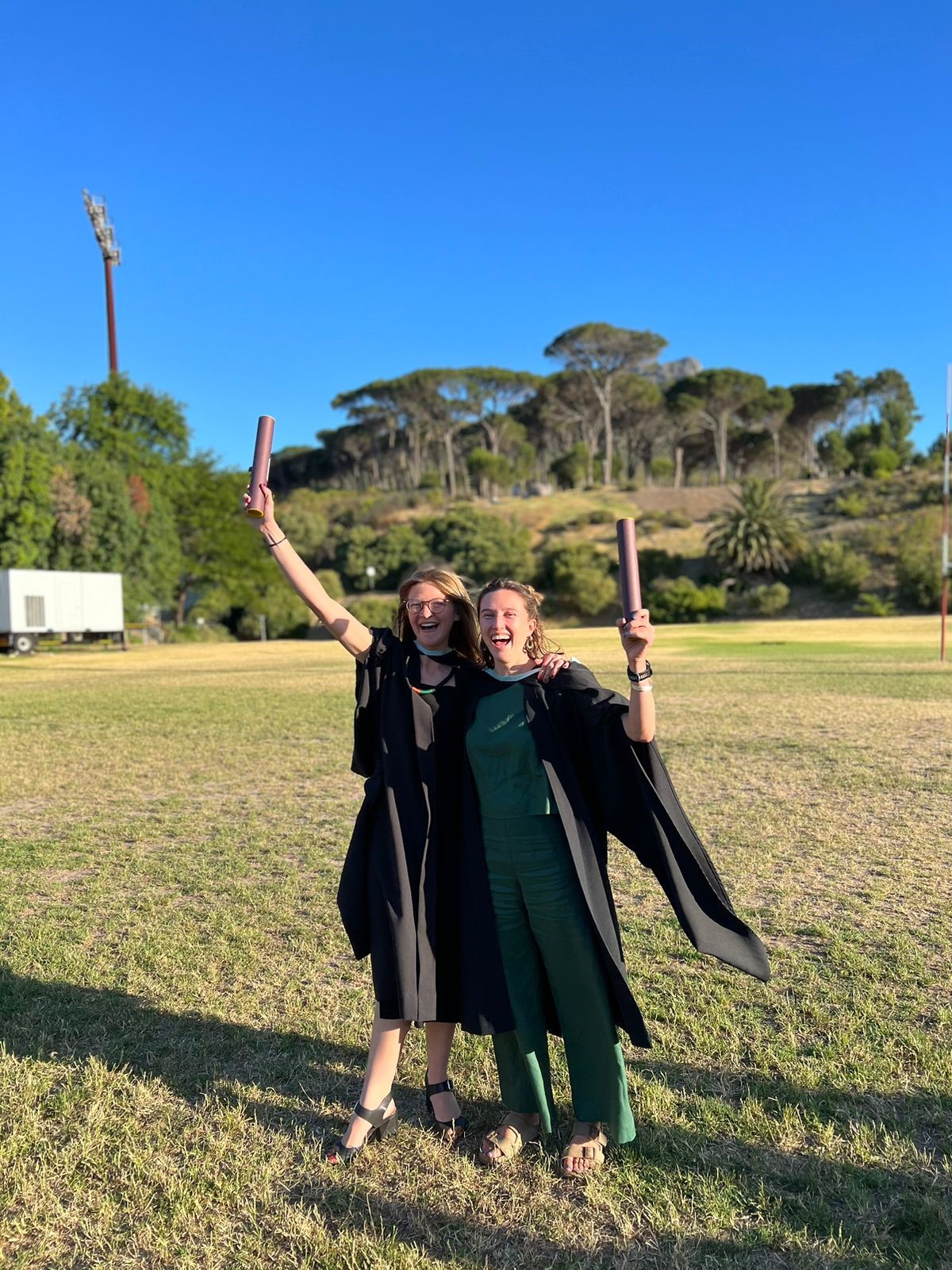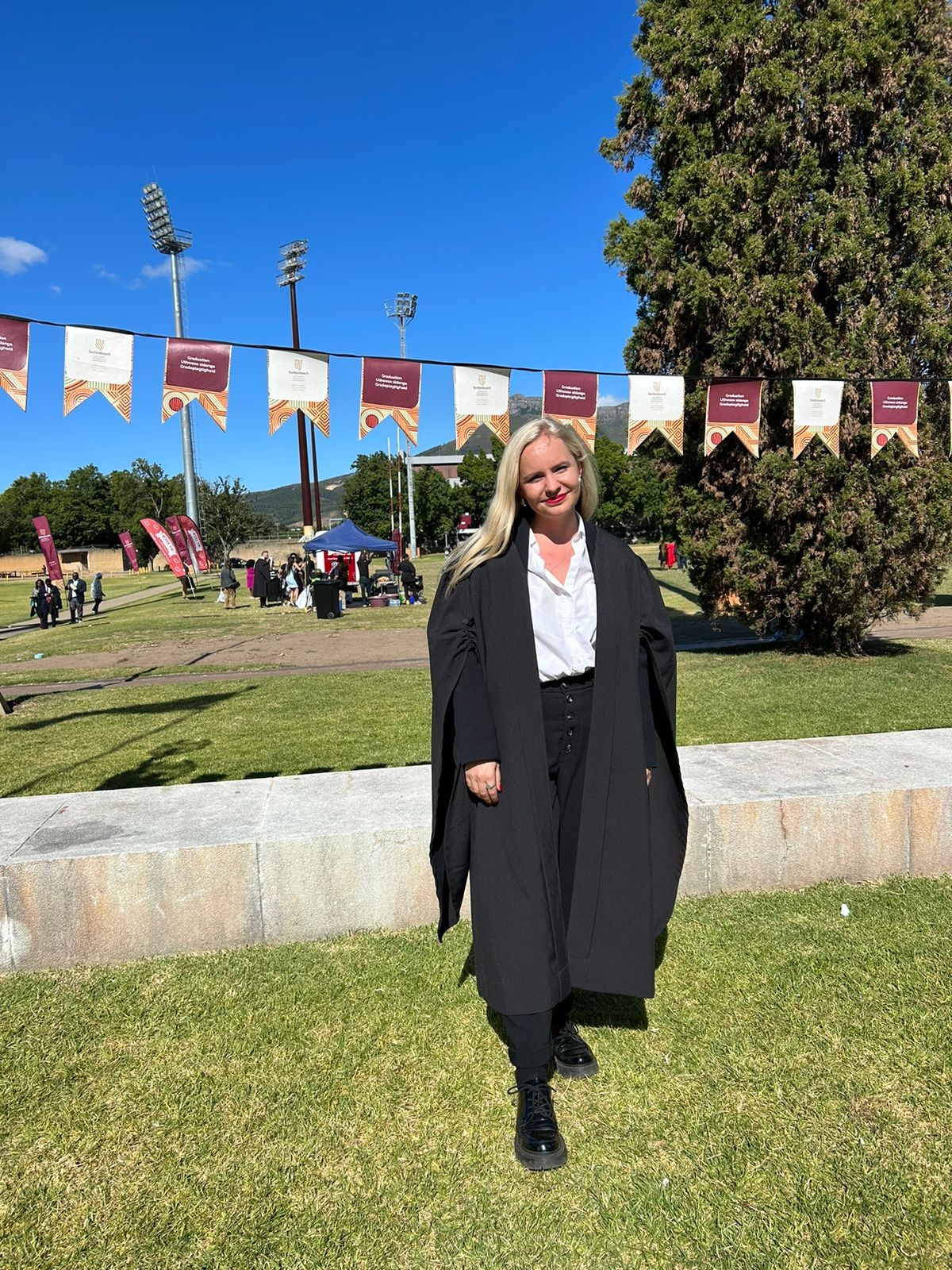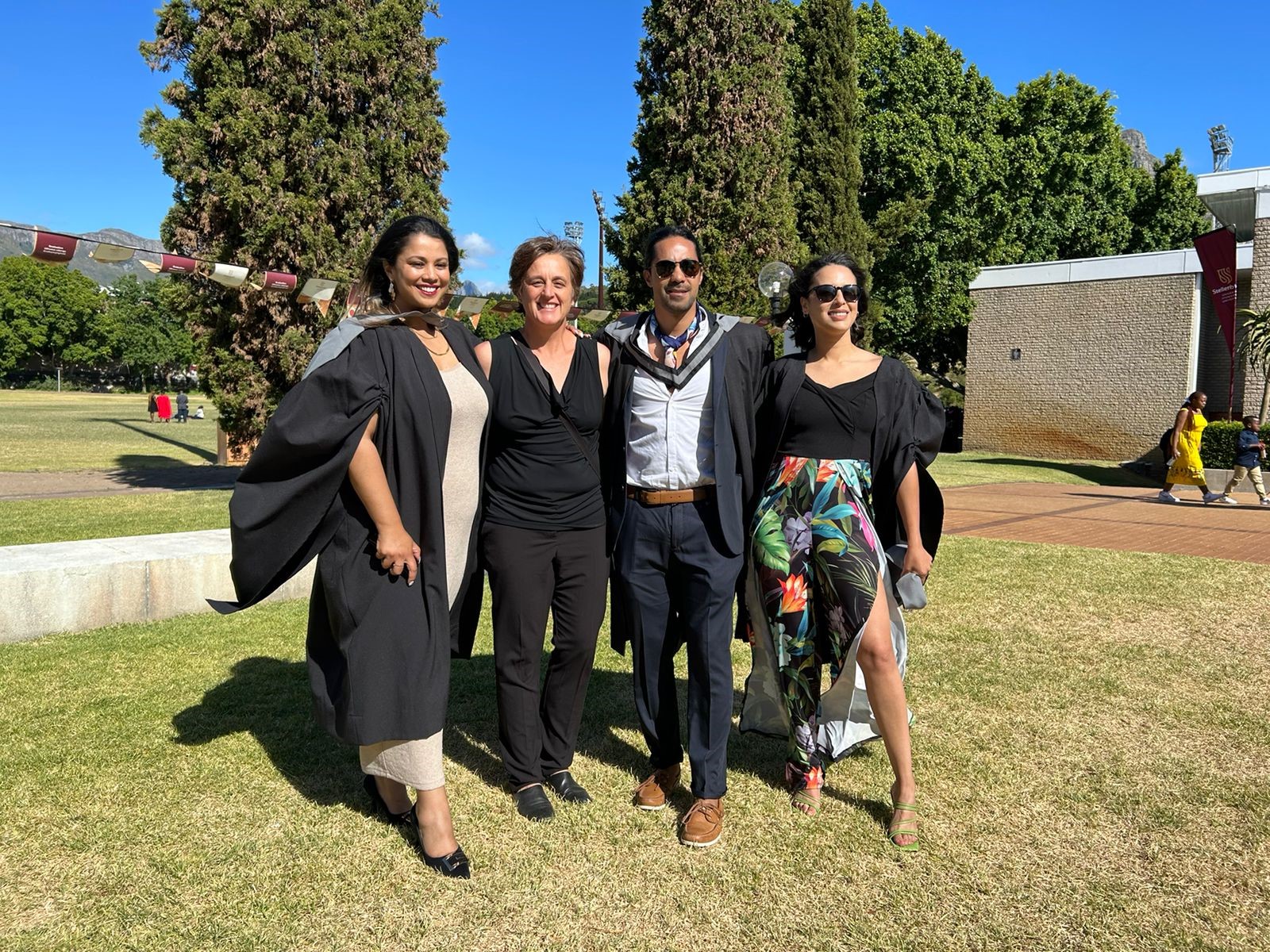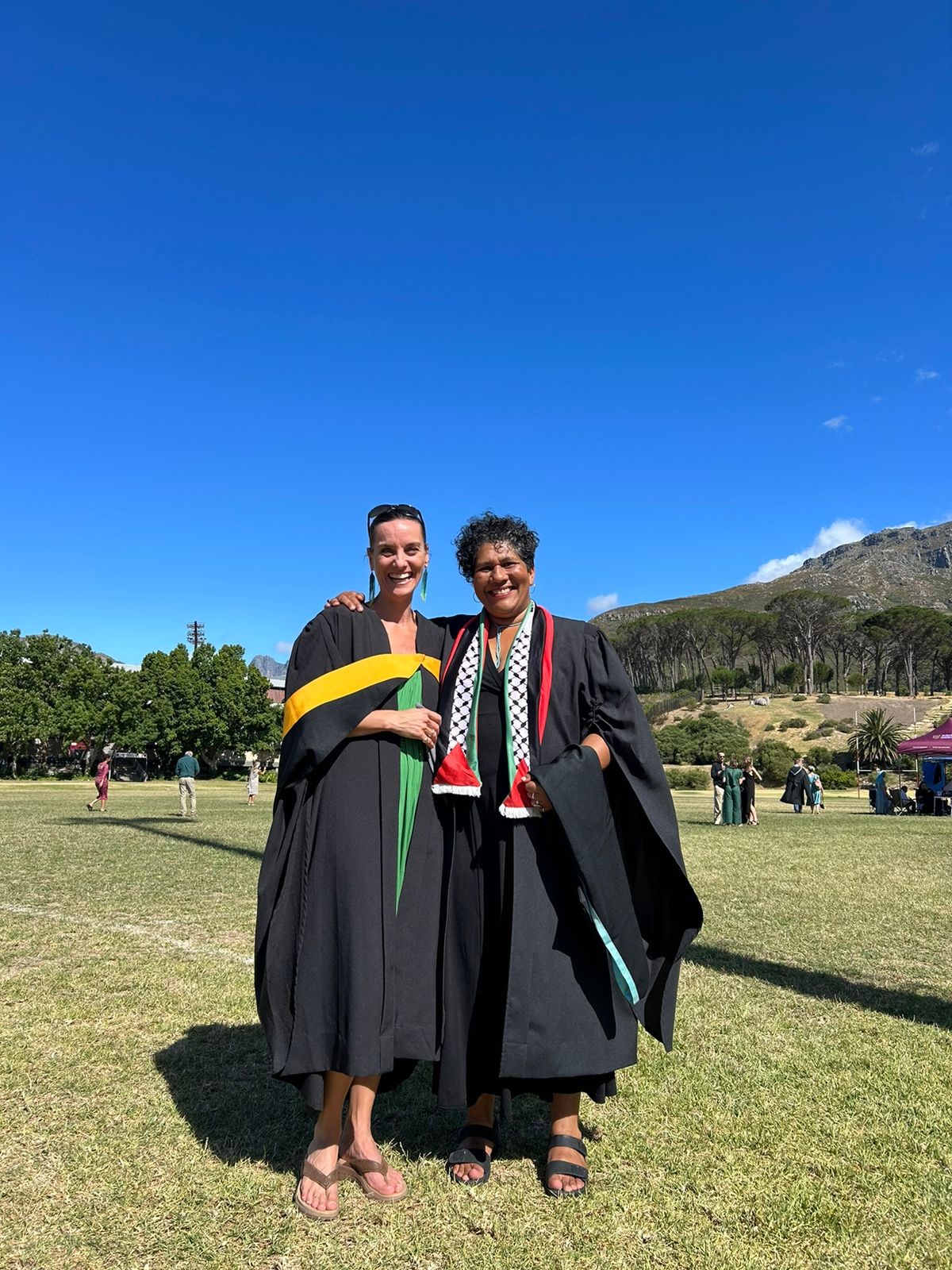The Centre for Sustainability Transitions (CST) is delighted to extend our heartfelt congratulations to the graduates of 2023 for their impressive accomplishment.
The ceremony, which took place in December 2023, celebrated the graduation of 33 students from the Postgraduate Diploma in Sustainable Development, six students from the MPhil in Sustainable Development and one student from the PhD programme.

CST graduates in Sustainable Development celebrate after the official graduation ceremony held at Stellenbosch University’s Coetzenburg Athletics Stadium in Stellenbosch.
For PGDip students, their academic journey involved an exploration of a diversity of themes related to sustainability in modules all aiming to cultivate their sense of individual and collective sustainability change agency. The MPhil cohort, through their engaged research across an even broader set of topics, has demonstrated a profound commitment to understanding and addressing pressing issues that have far-reaching implications for Africa’s future.
Achieving a postgraduate qualification from CST, situated within the Faculty of Economic and Management Sciences at Stellenbosch University, equips students with a unique skill set and knowledge base. Graduates emerge as critical and reflective thinkers and practitioners in the field of sustainability transitions, proficient in integrating knowledge from various disciplines and collaboratively generating insights with societal actors to address sustainability challenges.

MPhils in Sustainable Development Amy Murgatroyd and Amelia Timms.
The programmes help to develop the ability to comprehend and impact complex transitions processes across diverse scales, contributing to the enhancement of human wellbeing and a more sustainable global environment. For PGDip students, this focuses on providing a cutting-edge coursework that equips students to engage with sustainability challenges across a diversity of practical and professional settings. The MPhil programme enables students to develop critical research skills through a creative and exploratory thesis project, while the PhD programme develops African research leaders at the cutting edge of global sustainability science.

PGDip in Sustainable Development, Hannah Pamela Veronica Hopper.
PhDs in the CST are often trans- and interdisciplinary in nature, as is the case of graduant Blessing Kavu. Kavu’s thesis, “Investigating the impact and drivers of land use/cover change on surface water resources in the Okavango basin, using remote sensing and modelling”, combined remote sensing and geospatial modelling to determine the drivers and impacts of land use and land cover (LULC) change on natural resources in the Okavango basin. Using novel approaches, Kavu showed that LULC change in the Okavango is predominantly driven by anthropogenic activities, and that climate variability impacts water availability and distribution in the Okavango basin more than anthropogenic activities.
MPhil degree recipients engage in interdisciplinary research focused on specific place-based case studies, adding to the body of evidence that informs policymaking and decision processes, thereby shaping sustainability transitions at local, African, and global levels.
The current cohort’s themes explore a range of topics, including the CST’s deputy director, Nina Callaghan’s “Relational Governance for Sustainability Transitions”, which addressed the interconnected relationships crucial for lasting change. “Why South Africa Does Not Grow Organic Cotton?” by Jackie May, sheds light on challenges in sustainable agriculture, impacting global discussions on eco-friendly textiles. Millie Timm’s exploration, “Tropical Forest Fragmentation”, offers a global review enriched by African insights, emphasizing the vital role of local perspectives in environmental conservation.

Jody Nicole Wentzel, Prof Rika Preiser, Obayd Hoosain and Nicole Isebell Garcia after the formal graduation ceremony.
Amy Murgatroyd looked at new modes of implementing African-relevant monitoring and evaluation practices with her topic, “Made in Africa Evaluation (MAE) Approach”, bridging theory and application in culturally sensitive ways. Integrating climate change into “Mine Closure and Rehabilitation Strategies”, Megan Schulze’s work reflects a commitment to aligning industrial practices with just and sustainable environmental goals. Lastly, “Trophy Hunting as Payments for Ecosystem Services” by Luke Symonds-Mayes, explored norms in wildlife conservation, offering innovative insights into alternative economic models.

PGDip in Sustainable Development graduate, Keira Lee Powers, with MPhil in Sustainable Development graduate and CST deputy director, Nina Callaghan.
Critical for MPhil and PhD graduates, are the skills they build to translate and communicate co-produced knowledge and practices to a wide variety of societal actors and stakeholders.
Congratulations once again to the graduates for their outstanding achievements and invaluable contributions to the advancement of knowledge and sustainable practices in Africa.
December 2023 Graduates:
PhD Graduate
Blessing Kavhu
MPhil Graduates
Amy Murgatroyd
Nina Callaghan
Jacqueline May
Amelia Timms
Luke Symonds-Mayes
Megan Schulze
PGDip Graduates
Marie Madeleine Basson
Benjamin Samuel Carlyle
Letsie Chele
Gary Cotterell
Jodene De Villiers
Aedan John Foulkes
Nicole Isebell Garcia
Anna Michelle Hauff
Obayd Hoosain
Hannah Pamela Veronica Hopper
Erin Johnston
Isa Maria Klaasen
Gcinile Vila Mahlangu
Tswaledi George Maila
Dominique Marais
Lonwabo Clinton Mbam
Cait Jenna McCann
Carmen Maria Möllmann
Lesego Monametsi
Nomfundo Patricia Ndlovu
Thembisile Ndlovu
Amy Leigh Novak
Natasha Piprek
Keira Lee Powers
Lukhanyo Qamarana
Hendrietta Sarila
Sandi Theron
Francis Richard Thorold
Neo Tsiu
Natalie Shandre Van der Heuvel
Beatrix Hendrina Van Huyssteen
Celeste Eloise Van Tonder
Jody Nicole Wentzel